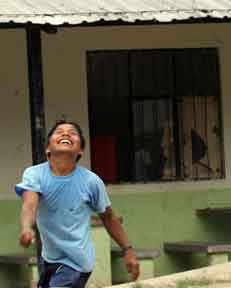End Notes: An Amazon Dialogue |
| Printer-friendly version | Email this article |
|
Why do we love our own ways, our own customs, so much that we think that other people want or need them?
by J.D. Phillips
IS WILDERNESS essential?
What about economic opportunity and self
I live in Indiana; I grew up in Iowa and Nebraska. So I am from one of the most developed and radically reshaped tracts of land in the entire world. There is no wilderness left where I come from. None. There hasn’t been for generations. We destroyed all of it. How can I—the economic beneficiary of my culture’s mastery and domination of this land (I even worked my dad’s farm when I was a boy)—muster the moral authority to even wish that the Amazon’s people not be allowed to reap the economic benefits that come from cutting more roads in the Amazon, from moving sandbars to build more bridges across her rivers, from drilling more oil wells in her virgin varzea forests? Well, I guess I don’t have the moral authority to wish it; but still, I wish it. I can’t justify myself.
It’s hard not to feel strong, immediate, and conflicting emotions as you travel through the Amazon Basin. The landscapes and the wild things are so stunning that at times they even seem improbable. But the indigenous villages look dilapidated; the people, destitute— shabby plywood houses with corrugated metal roofs; no windows, just holes in the walls; no electricity or running water; chickens and pigs wandering from hut to hut, wallowing in the mud. It’s hard for us to make it through two weeks of this without feeling like risktaking adventurers, slathered as we are in DEET, double-fisting malaria pills, arms still smarting from our pretrip immunizations, decked out in our latest L.L.Bean safari gear. But these people live here, without any of this stuff to hedge their bets, and in conditions far more "primitive" than the lodges we stay in, which themselves are more primitive than anything back home.
So perhaps we should help these people? Yes, that’s what we’ll do, we decide; we’ll help them. We’ll return next year on a service-learning trip, a secular mission, if you will.
Why should we do this? I ask. "You just don’t understand, Dr. Phillips," my students answer. "We’ve done mission trips before. It feels good to help other people." (They are from this remarkable first generation of students to come of age under the expectation that we will judge them by their public service record, I remind myself.)
"Well, these people really need our help; just look at them! If helping them happens also to make us feel good, so what?"
How can you tell they need, or even want, our help? They seem happy to me; happier, in fact, than many of the scowling and rushed folks back home. And the young people here, in the indigenous communities in the Amazon, seem downright joyful.
WHY DO WE LOVE OUR OWN WAYS, our own customs, so much that we think that other people want or need them? Are our ways really that much better than theirs? Why not consider a service-learning trip that brings a few of the indigenous people we’ve met in the jungles back to Indiana, to teach us how to live in the natural world without destroying it (not all of them want more roads), to teach us how to be happy like them? Which is the better service project? Honestly, I don’t know. But I do know that we need to know the good before we can do the good; so that’s what we’ll work on.
And yet…I still have the almost uncontrollable, visceral (and patronizing) desire to help these people, commingling uncomfortably with my self-assertive desire for the Amazon to remain untrammeled wilderness. As I said, I can’t justify myself.
So we traveled all the way to the Amazon—endured her exotic hardships and, quivering, received her forgiving kiss—just to notice (mind you, just to notice, not to resolve) our own contradictory desires and unrelenting, even tyrannical, self-assertion?
Well, yes, that’s exactly what we did.
J.D. Phillips is chair of the Wabash Department of Mathematics, as well as an amateur ornithologist and photographer. For the past two summers, he has led students through the Amazon Basin as co-teacher of the College’s Field Observation course in Ecuador. Contact Professor Phillips at phillipj@wabash.edu.
|

 determination? And how should we think about it when these two compete, as they do in the Amazon Basin?
determination? And how should we think about it when these two compete, as they do in the Amazon Basin? So we should help them so that we might feel good about ourselves? We should use these people as a means toward the greater end of our own happiness?
So we should help them so that we might feel good about ourselves? We should use these people as a means toward the greater end of our own happiness?